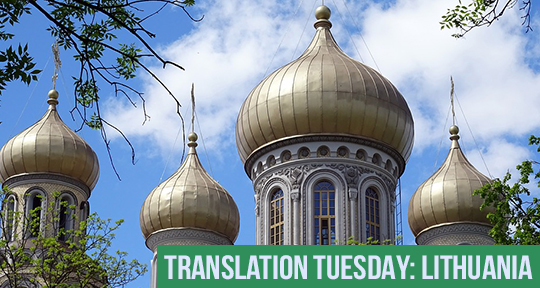This week’s Translation Tuesday sees Elizabeth Novickas render Ričardas Gavelis’ hallucinogenic modernism at its most intense and challenging. In this short extract, we follow the stray dogs, rubbish-tip flies, and neighbourhood drunks of Vilnius as the everydayness of their actions is transformed into something altogether stranger.
The most important musical happening in Vilnius—and therefore the Universe—is the brilliant concert of the flies over Karoliniškės’ garbage containers. It is considerably deeper and metaphysically purer than Tarasov’s famous fly-sound installation. It’s a true live concert brimming with improvisation; its sounds determine the movement of the stars, the smells of Vilnius’s streets, and Vilniutians’ sexual mores.
Those flies buzzing above the new gray containers are numberless, but only a complete idiot would say they’re identical, or more or less identical. If that was all they were, they certainly wouldn’t determine either the movement of the stars or Vilniutians’ sexual moods. Those flies are much more varied than humans: from the tiny Drosphila to the impressive horse shit fly. When Apples Petriukas went looking for the meaning of life in the garbage dumps, he counted one thousand seven hundred thirteen varieties of flies. I go up to Korals’ reeking garbage containers and simply wave to that surreal orchestra with my hand—I don’t even need a baton. The domain of the flies greets me with a majestic fortissimo, in which individual musical themes diverge only later: humming, whining, buzzing, as well as all the other fly sounds. But this is merely the beginning of the beginning—the buzzings will out-buzz one another; primary and secondary motifs will be born, as well as fly self-disclosures and leaps into infinity toward the Absolute of the flies. And on top of all of that, you need to add the smell! Only the concerto grosso of Vilnius’s flies synthesizes a flawless musical sound and an artistic smell. The reek of that concert is simply unmatched—almost as amazing as that of my attire.


